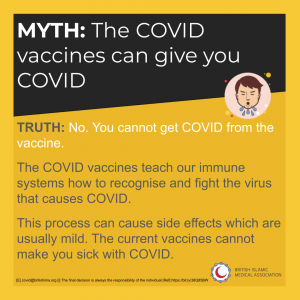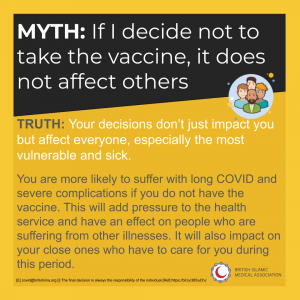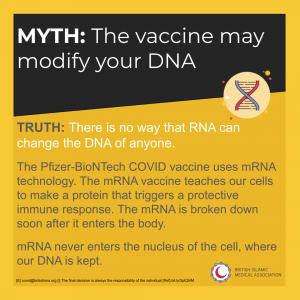COVID19: IT IS OUR MORAL DUTY
Earlier this year the Dost project hosted a free webinar for our BAME communities where we discussed the importance of improving confidence in the Covid-19 vaccine. Thanks to our panel of experts comprising healthcare professionals, faith leaders, and journalists we were able to debunk some commonly held myths around the vaccine.
Myth: The Covid-19 vaccine was developed too quickly. How can I trust it?
Dr Dumbor Ngaage, Cardiothoracic surgeon, Hull University Teaching Hospitals NHS Trust: The first case of Covid in the UK was in our Castle Hill hospital. And then very quickly the hospital was swamped with patients. The vaccine has become the major way out of this. Because of the deadliness of the virus, there was this huge push for the vaccine. The good thing about these vaccines is that they can be produced in large amounts in a very short amount of time. Also, there were a lot of processes that were running in parallel rather than in sequence. Previously you would wait for one phase (of trials) to finish before starting the next one. But because of the technology and the acuity of the need, some of these processes were running in parallel. So in no way was the safety compromised. We cannot compare vaccines made today with vaccines made 10 years ago because the processes are so refined today.
Dr Shoaib Faruqi, Respiratory Consultant Hull University Teaching Hospitals NHS Trust: As respiratory physicians, we have been working in the hospitals for over a year now managing people with Covid-19 pneumonia. My opinion is that the vaccine is absolutely safe and we all need to take it. There is no other way out. The numbers in the hospital are declining but this disease has not gone away. It is our moral responsibility to take the vaccine and, of course, increase the uptake of the vaccine among whoever we know. We might think it’s a small effort on our part to propagate this message but without it we might not see the numbers down and we won’t see the stress on hospitals decreasing. Covid is in the limelight but other conditions which the NHS looks after have suffered.

Myth: I’ve already had the vaccine. I’m not at risk of Covid anymore.
Dr Sharif Al Ghazal, President of British Islamic Medical Association: “This is a very common question. It’s very simple. If you’re driving a car and you have seat belt, will the seat belt stop you from having an accident? Of course not. It’s the same with the vaccine. But will the seat belt give you lots of protection if there IS an accident? The answer is: Yes. And this is exactly what the vaccine does. Having a seat belt, does it mean you are allowed to drive at 100 miles per hour? Of course not. That’s why we keep asking people to wear the mask, to observe social distancing till we’ve got enough people vaccinated.

Myth: The Covid vaccine can affect a woman’s fertility.
Dr Shoaib Faruqi, Respiratory Consultant Hull University Teaching Hospitals NHS Trust: “There is no effect as far as we know. In the various (vaccine) trials that we have undertaken so far – with more than 100,000 people – obviously some women would have become pregnant. But as far as we know there are no signals saying that there will be any problems for the pregnancy.

Myth: The Covid-19 vaccine is not safe because it has side effects.
Dr Dumbor Ngaage, Cardiothoracic surgeon, Hull University Teaching Hospitals NHS Trust: We do know that vaccines if they have any side effects, they usually occur within 2 to 3 months. When you look at all the vaccines that we’ve ever had, there is hardly any vaccine that has a long-term effect. We know about the myth surrounding the MMR vaccine and its links to autism, but that was dispelled, found to be untrue. In the 8 weeks observation on the Covid vaccine there were no serious side effects observed. The side effects that you get – fever, aches – is normal for any vaccine. What that simply indicates is that the body is producing an immune response to that vaccine which is what is intended. This vaccine is given in a controlled dose over a short period of time and does not actually cause the disease.

